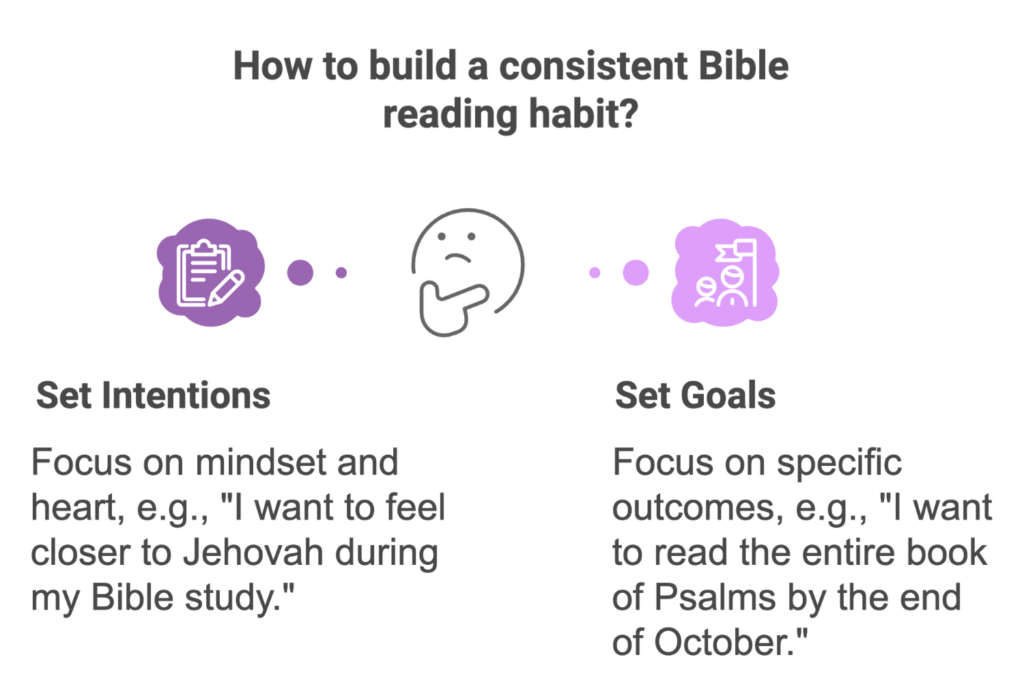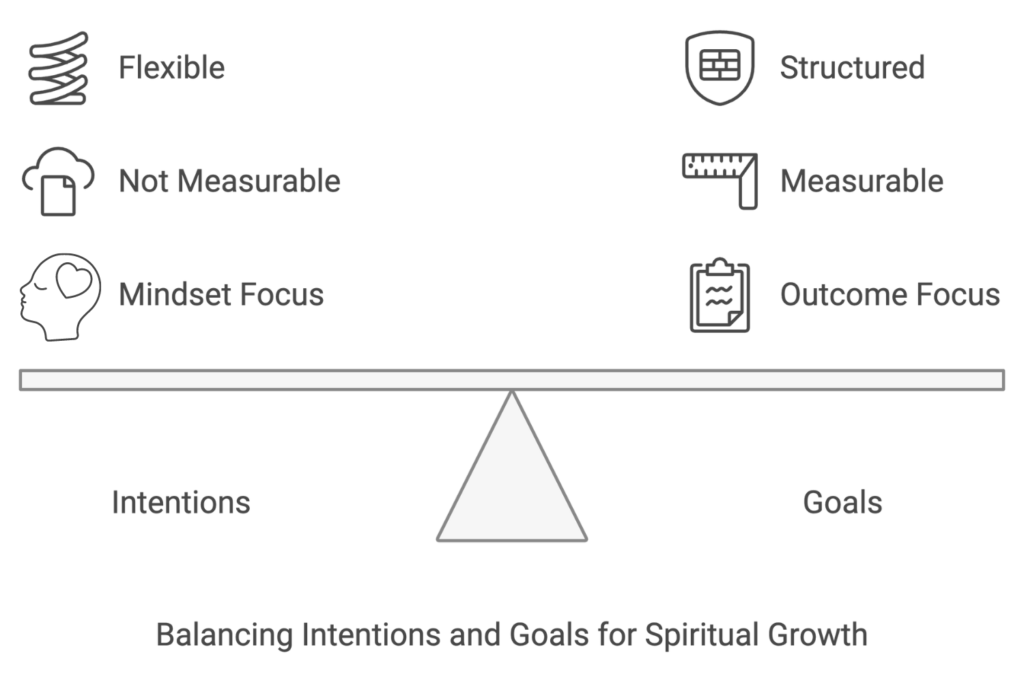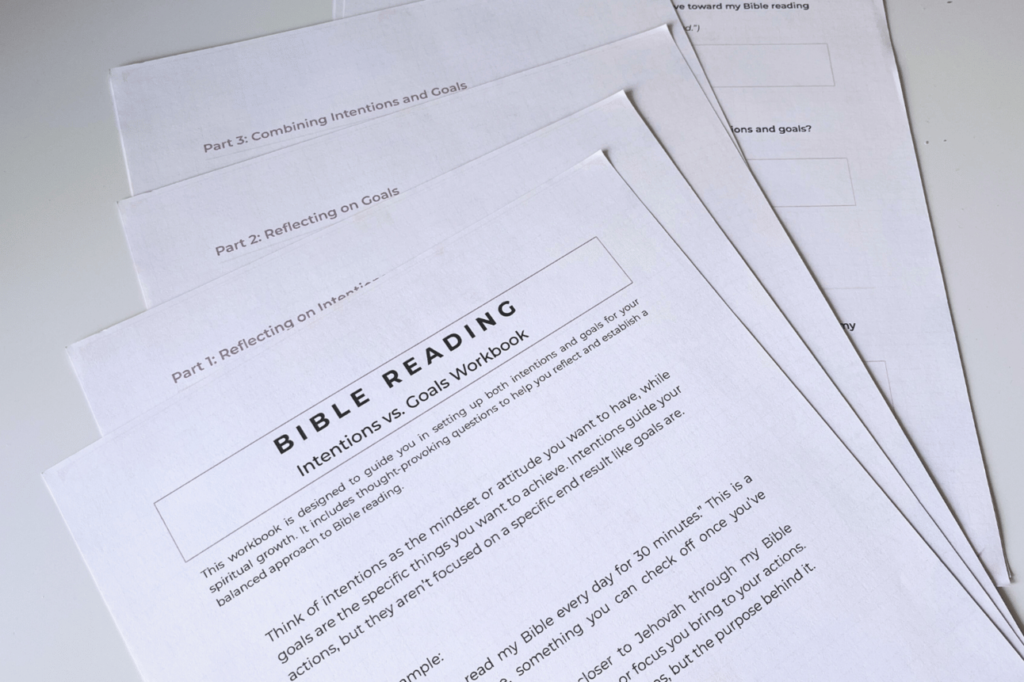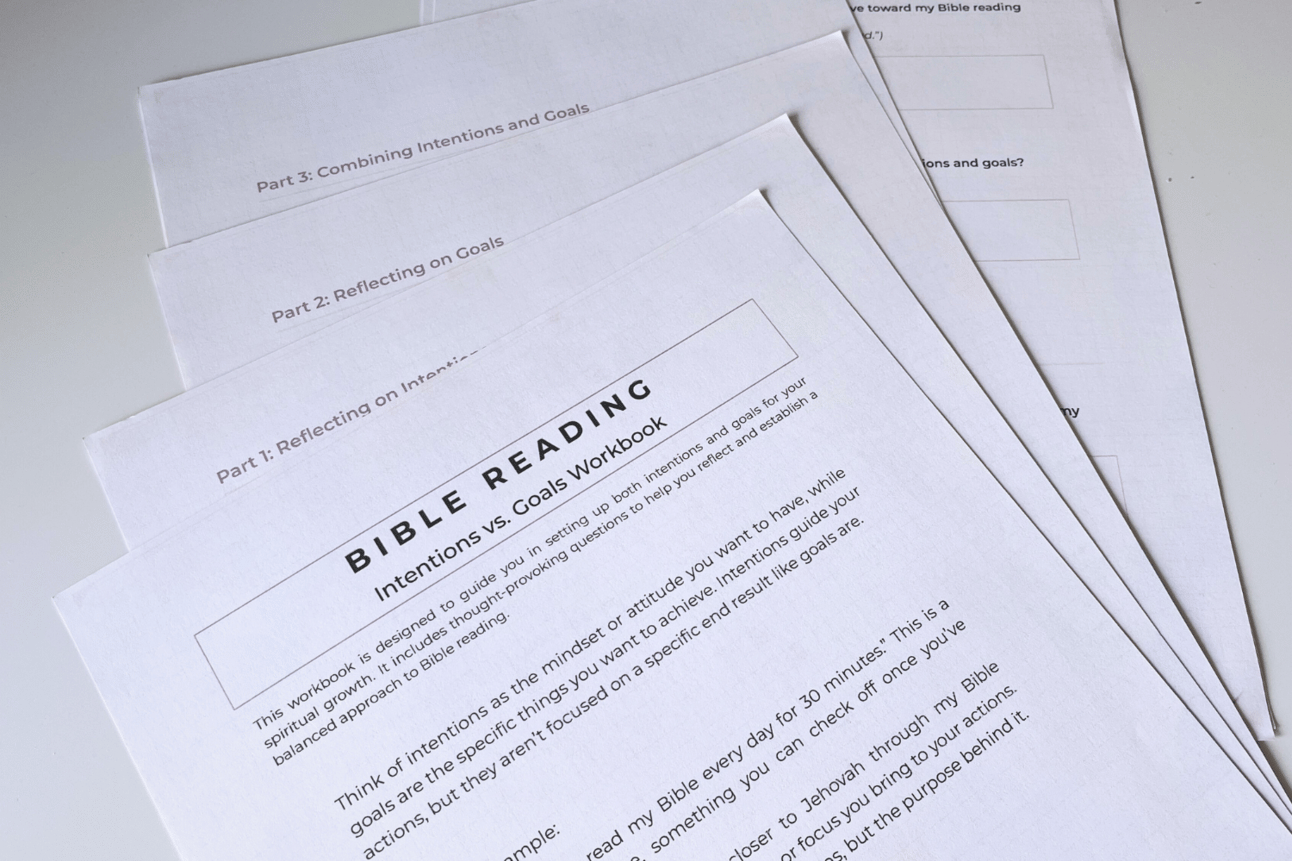I used to be really consistent with my Bible reading, but somewhere along the way, that habit slipped. Now, I find it tough not only to focus but also to stick with it.
In my search for something that could help, I came across the idea of setting intentions. After looking into how they work alongside goals, I thought it was pretty interesting, so I’m sharing it with you – especially if you’re struggling to build a Bible reading routine like I am.
Intentions vs. Goals: A Balanced Approach to Spiritual Growth
When it comes to deepening your relationship with Jehovah, both intentions and goals can be really helpful. Understanding how they work together can help you create a spiritual routine that feels meaningful and doable. Let’s break it down in a simple way!
What Are Intentions?
Intentions are more about how you want to feel or who you want to be in the moment. They’re not about reaching a specific outcome but about shaping your mindset and heart.
For example, you might set an intention like:
- I want to feel closer to Jehovah during my Bible study.
- I’ll approach each day with gratitude for Jehovah’s’ blessings.
Unlike goals, intentions aren’t measured or timed. They’re more like an ongoing guide for your heart and attitude, helping you feel connected to your spiritual journey right now, not just once you’ve achieved something.
What Are Goals?
Goals, on the other hand, focus on specific outcomes or actions you want to complete in the future. They are often measurable, like finishing a Bible reading plan, and come with a clear timeline.
Goals, on the other hand, are all about specific outcomes or actions you want to complete. They’re usually measurable, like finishing a Bible reading plan, and have a timeline.
For example:
- I want to read the entire book of Psalms by the end of October.
- I’ll memorize one scripture per week.
Goals give you structure and let you track your progress so you can feel a sense of accomplishment when you hit your target.

How They Work Together
Let’s say you want to make Bible reading a daily habit. Combining both an intention and a goal could look like this:
- Intention: I want to feel connected to Jehovah’s love every time I read His Word.
- Goal: I’ll read one chapter of the Bible every day for 10 minutes.
The intention focuses on your heart and mindset during your reading, while the goal gives you a clear action plan. Even if you miss a day, your intention still stands. You can always return to it without feeling like you’ve failed.
Why Focus on Intentions?
Sometimes, goals can feel like pressure, and if you don’t meet them, it can be disappointing. That’s where intentions can help. They’re flexible and more about how you’re approaching the present moment.
Even if you fall behind on your goal, your intention to stay connected to Jehovah is still there, keeping you positive and motivated.
Practical Example for Bible Reading.
Let’s say you want to improve your Bible reading habit. You can set both intentions and goals to keep yourself motivated while allowing room for growth.
Intentions:
- I’ll read the Bible with curiosity and openness.
- I aim to feel connected to Jehovah’s wisdom each day.
Goals:
- I’ll read the Bible for 10 minutes daily.
- I’ll finish the book of Proverbs by the end of October.
Having both keeps you focused on the journey (with intentions) while making steady progress (with goals).

What if you don’t meet your goals?
No worries! Your intentions are still a powerful guide. They help you refocus on what truly matters. For example, maybe you didn’t finish a book of the Bible as you planned, but your intention to strengthen your relationship with Jehovah is still there – and that’s what really counts.
Sometimes, not reaching a specific goal can actually show you where to adjust. Maybe you needed more time or a different approach. Instead of feeling discouraged, use your intentions as a reminder of why you started in the first place. Even small progress keeps you moving in the right direction!
Why Your Intentions Need a Plan to Succeed
But here’s the thing – intentions are a great start! They help you figure out what you want and why it matters. But intentions alone aren’t enough to reach any goal. Without action and consistency, they can just stay as ideas.
Here’s why:
- No Plan: without a clear plan, it’s hard to know where to start. You may feel motivated but unsure of what to do next.
- No Accountability: without something or someone to keep you accountable, it’s easy to get distracted or delayed. Goals need commitment, not just desire.
- Poor Time Management: intentions can get lost in the busyness of life if you don’t make time for them. It’s important to match your time with your goals.
- Emotional Ups and Downs: emotions can drive intentions, but since emotions change, they might not always keep you moving forward.
- Distractions: even with good intentions, distractions like social media or daily tasks can pull you off track if you haven’t built boundaries or habits around your goals.
When you pair your intentions with real steps and routines – like setting aside time for Bible reading – you’re more likely to reach your goals!
Conclusion
The beauty of using both is that they complement each other – intentions keep your heart open and centred, while goals push you toward measurable progress.
So, as you continue on your spiritual journey, remember that every effort to draw closer to Jehovah matters, and the goal isn’t just to achieve something but to grow spiritually and feel Jehovah’s presence each day.
–

So, my goal for October is to get back into the habit of Bible reading. If you’re in the same boat, I’ve created a 9-page workbook that might help!
This workbook is one of the perks my community members get! So, if you want to connect with others who share your passion for spiritual growth, join us. We do weekly check-ins to help each other stay committed to our intentions and goals – making Bible reading a meaningful part of our daily lives.
And if you’re already consistent with your Bible reading, I’d love to hear your tips on how you’ve managed to stick with it!

Leave a Reply